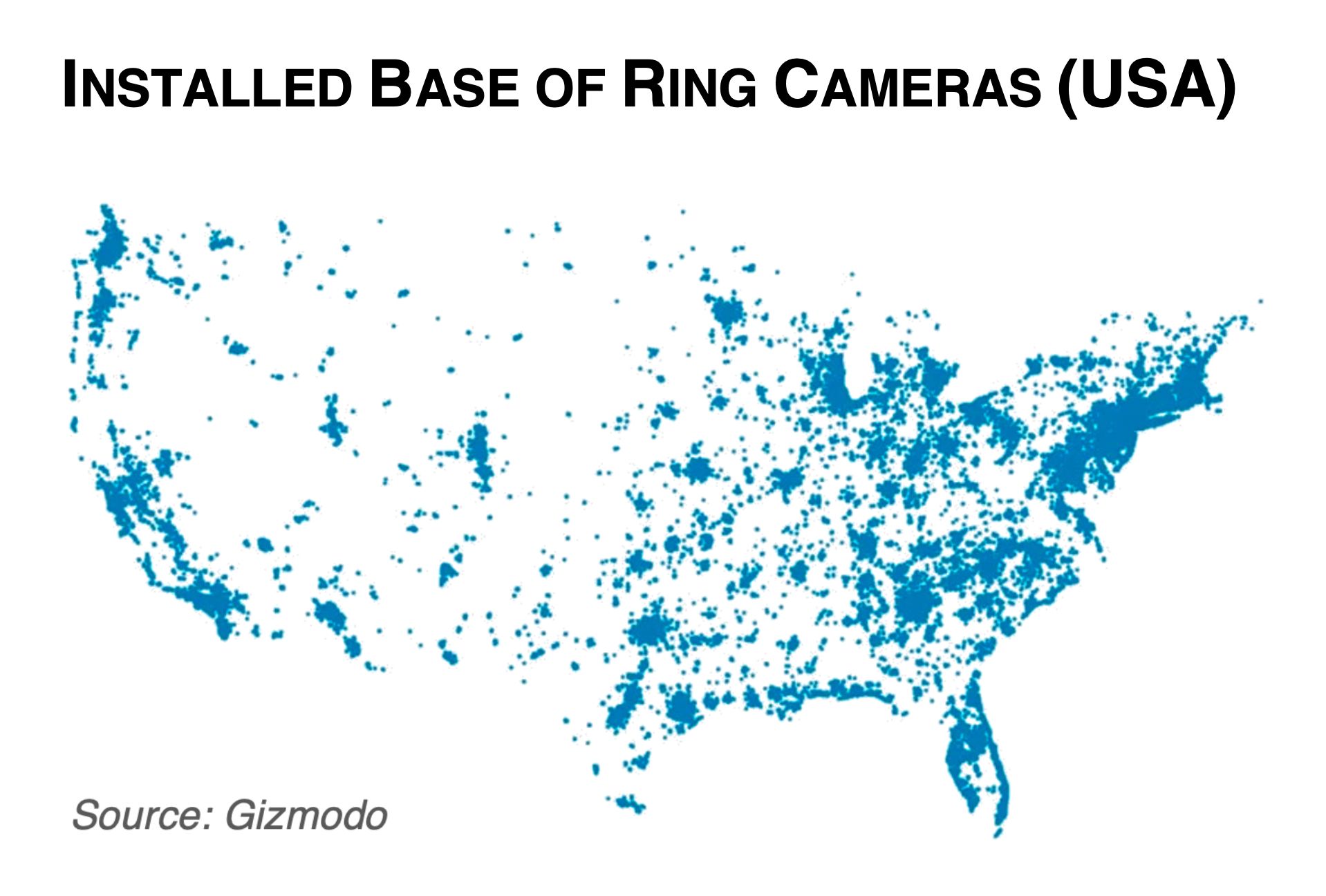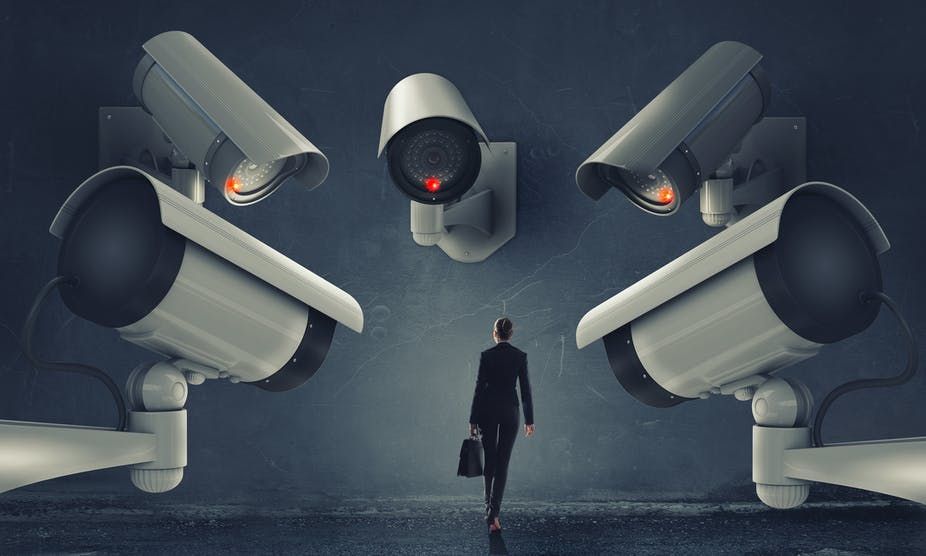
What is a surveillance state? Privacy International defines it as one which “collects information on everyone without regard to innocence or guilt” and “deputizes the private sector by compelling access to their data”.
While this may sound dystopian, this is quickly becoming a reality right here in the United States with serious implications on our civil liberties.
Despite its portrayal as the global poster child for surveillance, China is actually on par with the USA in regard to security cameras per capita; based on data from IHS Markit, there is currently one security camera per every 4.6 and 4.1 people in the USA and China, respectively.
While China’s security camera network is primarily government-owned, the majority of security cameras in the USA are consumer-owned. Interestingly, the rapid installation of over 85 million security cameras in the USA has been fueled by partnerships between the public and private sectors, namely police agencies and data-hungry tech giants.
The proliferation of security cameras in the USA is fueled by public-private partnerships between police and Big Tech.
The most striking example of this is Amazon’s Ring, whose aggressive nationwide expansion is fueled by 900+ partnerships with police agencies in 44 states. As part of these partnerships, police actively support the installation of Ring cameras via taxpayer-funded discount programs; in exchange, they gain access to Ring’s Neighborhood Watch Portal, a tool that allows police to request video footage directly from Ring users without a warrant.
For example, in Baltimore police are offering homeowners up to $150 rebates to cover camera and installation costs. The catch? They must share all of their video footage with police for at least two years. With police and Big Tech in control of our security camera infrastructure, new threats to our civil liberties are now just a “flip of a switch” away.

SUPERCHARGING SURVEILLANCE THREATS
America’s security camera infrastructure is emerging alongside other new technologies, such as artificial intelligence (AI). Clearview AI, a facial recognition company, made headlines in 2019 after launching a searchable database of over 3 billion photos of everyday people’s faces, scraped primarily from social media platforms.
Clearview AI licenses this database to customers, who can identify anyone from even grainy photos with surprising accuracy. In Feb 2020, Clearview AI’s list of over 2,200 customers was leaked, which included: USA Immigrations & Customs Enforcement (ICE), Walmart, Macy’s, and more than 600 North American police agencies.
Police agencies will undoubtedly use technologies like Clearview AI to better protect citizens. However, these technologies are often mixed, matched, and used in ways outside of their original intention. In fact, the potential threats are supercharged when multiple technologies are combined together.
What happens when Amazon’s security cameras are supercharged with AI-powered facial recognition, 100x optical zoom, and more? If history is any indication, a surveillance state-owned by Big Tech may be on the horizon. While regulations to restrict the use of AI in public spaces are being discussed, we cannot let the balance sheets of the private sector and with the persuasiveness of the public sector overshadow our right to privacy.

GOOD INTENTIONS DON’T LAST FOREVER
The same technologies built to work for citizens can be mechanized against them – this point is illuminated in a very real way by the Hong Kong protests in 2019. For months, Hong Kong’s CCTV system of 50,000 security cameras, normally used for things like finding lost children and managing traffic, was deployed to monitor citizens, reportedly using AI-powered facial recognition software.
In now-viral videos, people were seen ripping down CCTV poles and shining laser pointers at cameras to avoid being persecuted. This is evidence that after physical hardware infrastructure is installed, it only takes the flip of a switch to activate “emergency only” software-based capabilities.
It only takes a flip of a switch to activate “emergency only” software-based capabilities.
In the USA, “emergency-only” surveillance policies have also been instituted during times of crisis. The Patriot Act, which granted unprecedented surveillance privileges to US Intelligence agencies, was signed into law just 45 days after the 9/11 attacks. Almost 20 years later, it is still active but under a new name: the USA Freedom Act.
In 2013, the extent of invasive surveillance under the Patriot Act was illuminated by Edward Snowden, who exposed several large-scale, government-sponsored programs with cooperation from major telecoms and other private companies.
Through backdoor arrangements, the NSA effectively “flipped the switch” on US telecom infrastructure to silently monitor the calls, texts, and even locations of citizens for years. Just like our telecom infrastructure, our security camera infrastructure is owned by private companies and is susceptible to “flipping the switch”. But it doesn’t have to be this way – we still have time to build the human-centered future we deserve.
About IoTeX
Founded as an open source platform in 2017, IoTeX is building the Internet of Trusted Things, where all physical and virtual “things” — humans, machines, businesses, and DApps — can exchange information and value at global scale. Backed by a global team of 30+ top research scientists and engineers, IoTeX combines blockchain, secure hardware, and data services innovations to empower intelligent IoT networks and machine economies. By serving as a decentralized trust fabric for IoT, IoTeX will empower the future decentralized economy by “connecting the physical world, block by block”.
Website: https://iotex.io
Twitter: https://twitter.com/iotex_io
Telegram Announcement: https://t.me/iotexchannel
Telegram Group: https://t.me/IoTeXGroup
Medium: https://medium.com/@iotex
Reddit: https://www.reddit.com/r/IoTeX
Join us: https://iotex.io/careers




